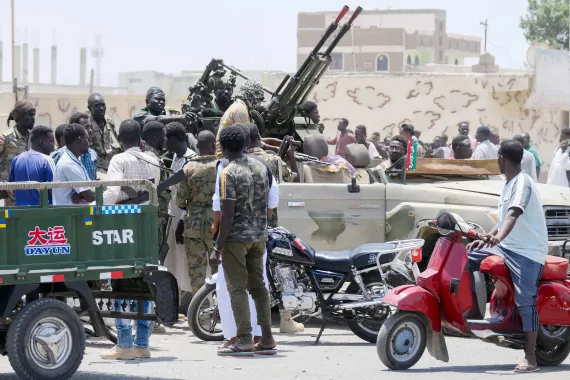How military rivalry escalated to Sudan war
Fears of a third coup in four years were raised when Sudan’s Rapid Support Forces (RSF), a paramilitary group that frequently operates under a different command structure but claims to work with the army, battled with the military on Saturday.
Mohamed Hamdan Dagalo alias Hemedti, the deputy leader of the Sovereignty Council, the supreme ruling body of the junta headed by Lt-Gen Abdel Fattah al-Burhan, is in charge of the RSF.
However, these differences have been widely known. Omar al-Bashir, Sudan’s longtime leader who was deposed in April 2019, has been the subject of a protracted conflict between the two wings of the country’s security apparatus that mostly centers on their different victories in the period following his ouster.
Their argument is also related to the rivalry between RSF and army head al-Burhan on a personal level.

The latest round of disagreement, and hence the reason for their clash, occurred following the signing of the Framework Agreement establishing the transitional period on December 5. The junta was to re-sign a deal for a new transitional government led by civilians this month. It collapsed, following the junta’s own internal wrangling.
The framework said Sudan’s military will quit politics and hand over power to civilians. It also provided for the integration of RSF into the ranks of the army, a sticky matter that aroused differences.
The rift between Burhan and Hemedti, may place the country into a third coup in four years. But it actually threatens the four-year journey of the transitional period since the overthrow of former president Omar al-Bashir after the Sudanese revolution in 2019.

Sudanese civilians run past a military vehicle in Khartoum on April 15, 2023, amid reported clashes between the country’s paramilitaries and regular army. PHOTO | AFP
In October 2021, Burhan forcibly took over power after dissolving the cabinet of the transitional government led by former Sudanese prime minister Abdalla Hamdok. It isolated the country and saw aid suspended for its key projects. This came just after the US had lifted sanctions on Sudan, which would have opened investors into Khartoum.
An open secret
Initially as a junta, the two leaders let their differences boil under the table. It had been common knowledge that their rivalry was playing even in deals they made with outside entities, such as Russia. After the Framework Agreement was signed, it became an open secret.
But they have also been met with a hardline civilian movement which wants nothing from the military in running the politics of the country. Everyone else including the African Union, Intergovernmental Authority on Development (Igad) and the United States have demanded a civilian-led government.
As it is, Sudan is suspended from voting at the AU and United Nations. But it chairs Igad, the regional bloc in the Horn of Africa.
So how did the junta crack?
Al-Burhan had been trying to isolate Hemedti for a while. One such sign was when Khartoum signed an updated version of the peace agreement with the armed movements in Juba, South Sudan. Sovereignty Council member Shamsuddin Kabbashi signed the agreement on behalf of the government instead of Hemedti, who had signed the first version with the movements in October 2020.
Al-Burhan also stopped Hemedti from receiving security, diplomatic and criminal reports he was routinely receiving. In fact, Hemedti was also denied role in dealing with the country’s peace bids.

In this file photo taken on June 8, 2022 Sudan’s paramilitary Rapid Support Forces commander, General Mohamed Hamdan Dagalo (Hemedti), now de facto deputy military leader, attending a meeting in Khartoum. PHOTO | AFP
But Hemedti isn’t new to the game. Some five years before Bashir ouster, he was consolidating his influence in the capital Khartoum. He created the RSF, an offshoot of the Janjaweed militia feared for its atrocities in Darfur in the 2003 rebellion which Bashir crushed and earned an indictment at the International Criminal Court.
RSF was integrated into formal security service in 2013. And after the coup in 2019, Sudan’s army and the RSF maintained their relationship against the transitional government of Hamdok.
Hamdok won the hostility of the duo together after he sought to solve the problems of his country’s economy and eliminate the depletion of the local currency by several decisions that included transferring military investments into joint stock companies.
This was rejected by the military, offering instead that those companies pay the prescribed taxes without being put under civilian supervision. Hamdok also clashed with the RSF over an initiative that included attaching those forces to the military and regularising their status. Ultimately, Hemedti and Al-Burhan agreed to oust Hamdok in October 2021.
Hemedti playing good cop
That appears to be last time their interests converged. They have been differing on how to move the transitional programme forward.
Additionally, they haven’t come to an agreement on significant adjustments to foreign policy, including Hemedti’s contentious choice to meet with Israeli officials secretly. This was perceived as Hemedti’s attempt to gain support abroad in order to further his domestic political agenda. Along with improving relations with Russians in the countries he recently visited, Hemedti is stated to value security collaboration for the RSF.
Even though it is obvious that Hemedti did not like the PM, he did not publicly react when Hamdok was dismissed.
Now he prefers to flirt with the street by raising demands for change and demanding civil rule. Even if he finally agrees to a civilian rule, perhaps he knows playing good cop may save him from any punitive measures on his conduct by the new civilian-led government.


